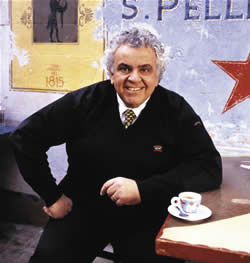It’s been 15 years since restaurateur Roberto Martella (BA 1985 St. Michael’s) started hosting Language and Linguine classes at his uptown Toronto restaurant, Grano, and he still attracts a full house. The attendees at tonight’s Italian language class are mostly women, mostly middle-aged, and are grouped at tables waiting for Martella to appear. It’s one of the first classes since he won the Jane Jacobs Prize, which celebrates Toronto’s “original, unsung heroes,” and one senses that the guests are here as much for him as for the language or linguine.
Martella, an irrepressible bon vivant, used to teach the class himself, but now leaves that to Susanna Ranalli, a professional teacher.“Susanna has more patience than me,” Martella says later over a glass of Italian red.“I always ended up getting the class drunk.” He laughs. “So that’s why I teach the class on food and drink and leave the rest to her.”
A world traveller with a background in education, management and public relations, Martella settled into the restaurant business 21 years ago so that he could work with his wife, Lucia (BSc 1985 Erindale), a chef. His aim was to serve Italian culture as well as food – and he drew in the Yonge and Eglinton community by organizing classes. (Martella was born in Canada, but his parents were from Italy.)
The Martellas live in the apartment above Grano (two of their four children still reside with them), and they view the restaurant as an extension of their living room. Both areas are decorated with the same warm colours, and adorned with Italian movie posters and colourful Italian plates. The family moves between both spaces with ease.“People treat their daily lives as if they’re in an elevator,” says Martella. “They can be with the most attractive people and they don’t connect. That’s what community is about – enriching yourself by learning about your fellow person and, in turn, you learn about yourself.”
Martella collaborated with Jane Jacobs (the urban philosopher and activist who died in 2006) on several occasions. When he found out that Jacobs wanted to meet Hernando de Soto, president of the Institute for Liberty and Democracy in Lima, Peru, he arranged it. Martella offered his restaurant, as one would offer one’s house, inviting not only Jacobs and de Soto, but media, city luminaries and ordinary people. This was the first of his dinner salons, which are now the Grano Series. Past speakers include Michael Ignatieff (BA 1969 Trinity) and journalist Christopher Hitchens. American writer Gore Vidal will speak in May. Jacobs propagated the idea of “commensality,” or, building community by breaking bread together; it’s something Martella does well.
Martella aims to use the Jane Jacobs Prize – a stipend of $5,000 each year for three years – to create, with city council members and developers, a space for the Piazza Jane Jacobs in Toronto.He intends for it to be a public meeting place, a cultural hub, for people from all walks of life. Martella makes this analogy:“A piazza is a public manifestation of the private table. In the old days, and to some degree even now, the table was where babies were born; where the dead were laid out; where you worked, read, baked; where the family gathered and lived. This is what a piazza is – a place where you can have a political demonstration, a market and a wedding – it’s extremely democratic.”





